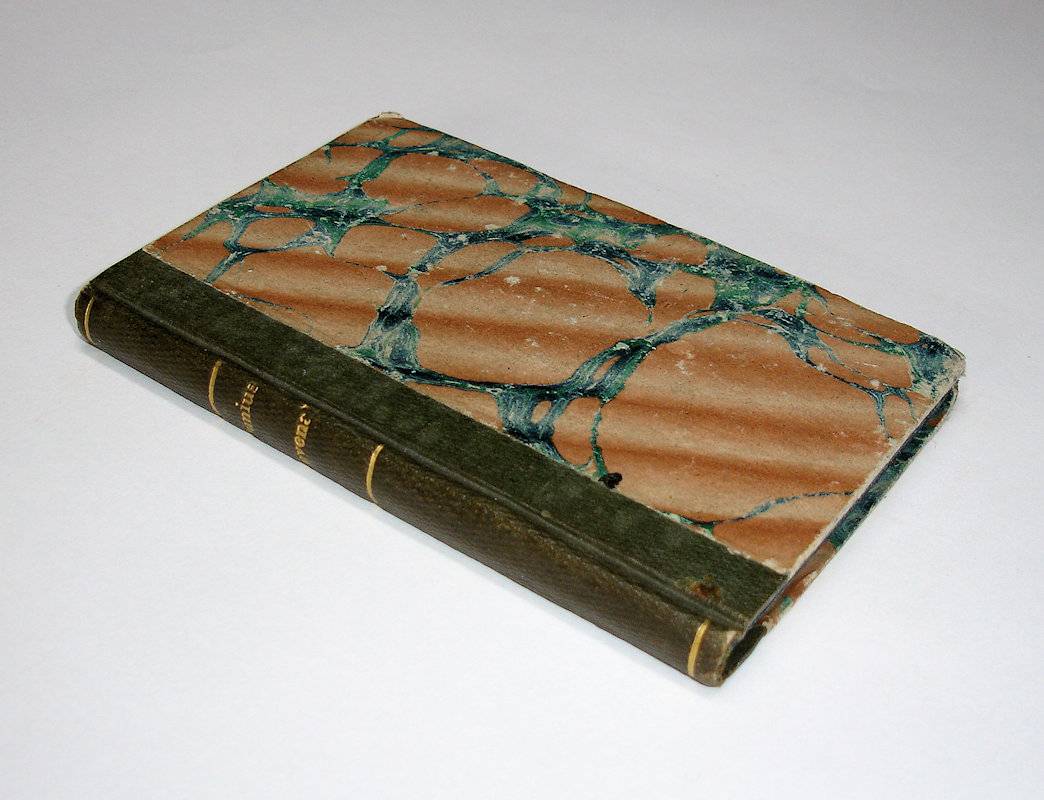JUVENALIS.
D. Iunii Iuvenalis Satirarum libri V. Sulpiciae Satira. Nova editio, cura Nicolai Rigaltii.
Paris (Lutetiae), Ex officina Rob. Stephani, 1616.
12mo. (XL),126,(2 blank) p. 19th century half cloth. 13.5 cm 'The most important, most widely read, most influential classical poet throughout the 17th and 18th centuries' (
Ref: Schweiger 2,503/04: 'Neue Recension, nach Handschriften. Die Noten sind kurz und von Werth. Sauber und nicht häufig'; Dibdin 2,154, on the editions of 1613-1616: 'These editions especially the latter, are classical and correct, and the type is beautiful'; Renouard, Robertus tertius, p. 202; Moss 2,158; Graesse 3,520; Ebert 11236) (
Details: Back ruled gilt, boards marbled. Woodcut printer's Olive tree device of the Stephanus family on the title, motto: 'Noli altum sapere, sed time', in English 'Donot be high-minded, but fear'. (Epistola Beati Pauli ad Romanos 11,20) The preliminaries of this book contain N. Rigaltius' treatise 'De satira Iuvenalis', and five pages testimonia; p. 1-105 contain the text of the satires, p. 106-126 the notes of Rigaltius, which are highly praised by the bibliographers; Ebert observes: 'The notes are short, but full of matter') (
Condition: Corners slightly bumped. The last 6 pages, containing notes of Rigaltius, have been bound by mistake at the end of preliminary pages) (
Note: The Roman poet Juvenalis, ca. 55-140 AD, was the last and the greatest of the Roman satirists. He left 16 hexametric satires, in five books, averaging 750-800 lines each, and apparantly arranged in the order of publication. He 'uses names and examples from the past as protective covers for his exposés of contemporary vice and folly'. (The Classical Tradition, Cambr. Mass., 2010, p. 501) In the first satire already Juvenal writes that he cannot help writing satire, seeing the corruption of Rome, and confesses that for safety reasons (he lived in an age of absolute monarchy), he would only attack the dead. His main theme is the dissolution of the social fabric in a city that was swelling like a tumor, where wealth was unevenly divided, and which was filled with the smell of decay. 'Something more like that age was born in the 17th century and lasted until revolutions destroyed it. Something like Juvenal's Rome appeared, in Venice and Paris and Madrid and London; men and women very like his (Juvenal's) courtiers and courtesans swaggered through Versailles and Blenheim and scores of petty palaces; men like Juvenal himself were flogged by the duke's footmen, or, after waiting in the earl's vestibule, were repulsed from his door. Much of what Juvenal says is permanently true and has been admired through many changing centuries. But when his poems are read in an age like that which produced them they acquire a double energy, an intenser truth. So throughout the 17th and 18th centuries he was one of the most important, most widely read, most influential, best understood classical poets'. (G. Highet, 'Juvenal the satirist', Oxford 1955, p. 213/14)
§ Wikipedia offers very sketchy information about the French classical scholar Nicolaus Rigaltius, or in French Nicolas Rigault, 1577-1654. His Vicipaedia article is however perfect, it contains useful information, literature and links on this lawyer, scholar and libarian (after Casaubon) of Louis XIII. In 1599 he published the 'editio princeps' of the 'Strategicon' of Onosander, and later on he produced texts and commentaries of several classical and byzantine authors, e.g. 'Phaedrus' (1599), 'Nicolai Rigaltii Glossarium taktikon mixobarbaron' (1601), 'Martial' (1601), 'Oneirocritica' (1603), 'Rei accipitrariae scriptores', (editio princeps 1612), 'Menandri et Philistionis sententiae' (1613), 'Juvenal' (1616), 'Tertullian' (1628), 'Minucius Felix' (1643), 'Cyprianus' (1648).
§ The French scholar Pierre Pithou, 1539-1596, published in 1585 a superior text of Juvenalis and Persius. This edition served in 1616 as a model to Rigaltius, whose edition in its turn served as a model to editors of Juvenalis for almost 200 years. (Housman 1931)) (
Collation: a12, b8; A-E12, F4 (The last gathering, gathering F, p. 121/126, was bound erroneously between the leaves b4 and b5 of the preliminariary leaves; leaf F4 blank) (Photographs on request)
Book number: 120360 Euro 260.00
Keywords: (Oude Druk), (Rare Books), Juvenal, Juvenalis, Latin literature, Satires, Satyrae, antike altertum antiquity, römische Literatur
 JUVENALIS.
JUVENALIS.

